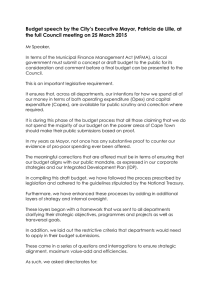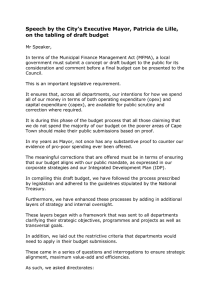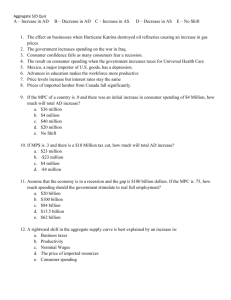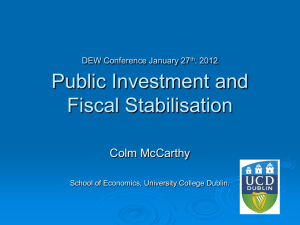SPEECH BY EXECUTIVE MAYOR ALDERMAN PATRICIA DE
advertisement
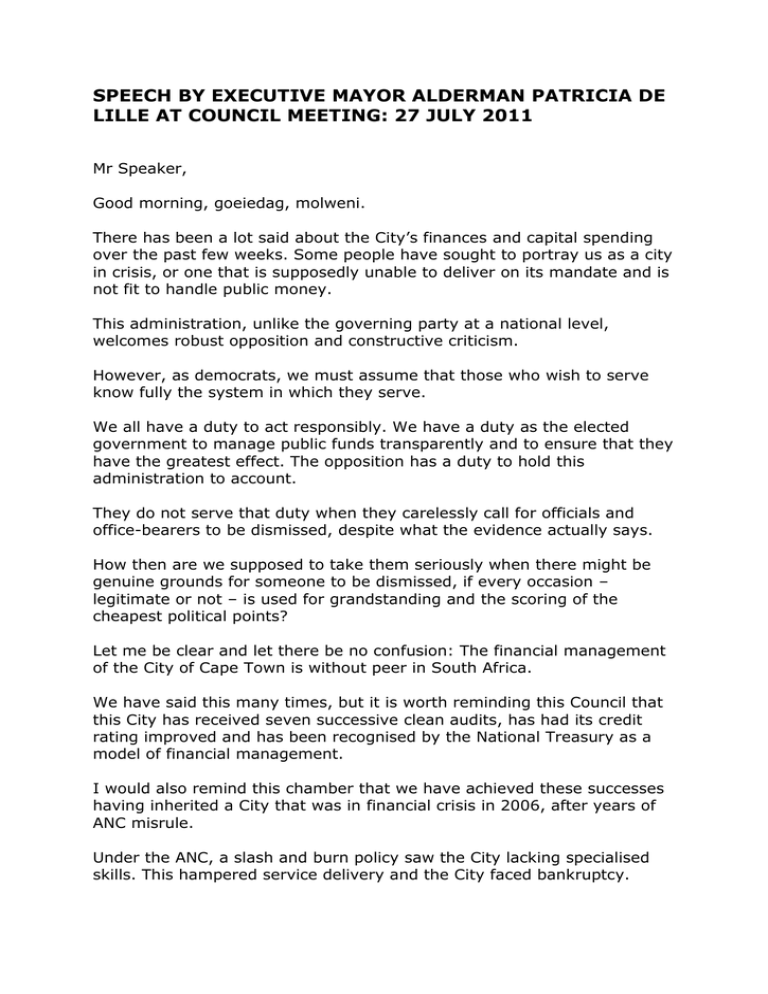
SPEECH BY EXECUTIVE MAYOR ALDERMAN PATRICIA DE LILLE AT COUNCIL MEETING: 27 JULY 2011 Mr Speaker, Good morning, goeiedag, molweni. There has been a lot said about the City’s finances and capital spending over the past few weeks. Some people have sought to portray us as a city in crisis, or one that is supposedly unable to deliver on its mandate and is not fit to handle public money. This administration, unlike the governing party at a national level, welcomes robust opposition and constructive criticism. However, as democrats, we must assume that those who wish to serve know fully the system in which they serve. We all have a duty to act responsibly. We have a duty as the elected government to manage public funds transparently and to ensure that they have the greatest effect. The opposition has a duty to hold this administration to account. They do not serve that duty when they carelessly call for officials and office-bearers to be dismissed, despite what the evidence actually says. How then are we supposed to take them seriously when there might be genuine grounds for someone to be dismissed, if every occasion – legitimate or not – is used for grandstanding and the scoring of the cheapest political points? Let me be clear and let there be no confusion: The financial management of the City of Cape Town is without peer in South Africa. We have said this many times, but it is worth reminding this Council that this City has received seven successive clean audits, has had its credit rating improved and has been recognised by the National Treasury as a model of financial management. I would also remind this chamber that we have achieved these successes having inherited a City that was in financial crisis in 2006, after years of ANC misrule. Under the ANC, a slash and burn policy saw the City lacking specialised skills. This hampered service delivery and the City faced bankruptcy. Through careful and systematic management, we have reversed this situation and ensured that Cape Town stands virtually alone as an example of fiscal probity and service excellence. We have also ensured, since 2006, that we have maintained our capital spending on key projects and infrastructure improvements. If we had not invested in this manner, there is every chance that we might not have been able to keep the lights on or the water running from our taps. Instead, our sound financial management has also seen us balance a number of important priorities. These include: ensuring that we upgrade our ageing bulk infrastructure; investment in critical projects to build an inclusive city such as the IRT; and the provision of the most extensive package of free basic services to the poor of any metro in the country. One of the most important effects of sound financial management can also be seen in how we have managed to dramatically increase expenditure on upgrades in informal settlements since 2006. As I have outlined in my reply to a Council question, it is clear that prior to 2006 there was no systematic plan in place to deal with the most basic needs of people living in often unacceptable conditions. Last year, we spent approximately R23 million on combined operating and capital expenditure for water and approximately R122 million on combined capital and operating expenditure for sewers – all for upgrading these settlements. There is still much work to be done, but it is clear that we have made progress. Given this evidence, I find it surprising that some members of this Council can accuse us of being anti-poor or financially irresponsible, when the evidence is there for all to see. Mr. Speaker, the opposition is entitled to their opinion. But they are certainly not entitled to their own version of the truth. That being said, I must inform Councillors that we are disappointed with the capital spend for the last financial year, which currently stands at 71,5%. This is below our target of 80%. However, it is worth noting that, since 2006, we have spent on average 80% of our capital budget per year and this figure is higher than the ANC ever achieved while in office. Unfortunately, in the real world of delivery, there are often factors beyond our control that influence spending. Our responsibility now is to ensure that we do everything possible to mitigate these risks and ensure that we aim for a spending figure in excess of 80% for this financial year. I would ask this Council to listen to the reasons accounting for our capital spending figure so that they may execute their duties of oversight with the full and proper body of information we have. This is an explanation and not an excuse. The reasons for our capital expenditure figure include: the late transfer of R168 million for the IRT from the national government, which was impossible to spend in the short time available; the over R270 million saved on the stadium; and tender appeals, especially a court judgment last year that has allowed any bidder to appeal a tender award within three weeks – resulting in lengthy exercises that have affected over R100 million worth of spending in the last financial year. There were additional factors which were also beyond our control. These include: the delays in plant and equipment as a result of the tsunami in Japan; a bitumen shortage in the Western Cape and the Cape Town refinery’s decision to stop manufacturing 60/70 penetration grade bitumen, which negatively impacted on some projects; the delay of the Lotus River upgrading project due to the need to relocate existing informal dwellings to the serviced site with refusal from the community to move until all services had been provided; the delay of non-motorised transport projects city-wide due to longer than expected public engagement processes and unusually long design periods; and land acquisitions which have taken longer than expected due to protracted negotiations with owners. These and other factors have all contributed to the unsatisfactory capital spending for the past year. However, I must emphasise that all spending in the City of Cape Town complies with the law, the strict provisions of which are often ignored in other municipalities. Indeed, the straight-jacket of compliance regulations was highlighted with Minister Trevor Manuel at a joint Provincial cabinet and Mayco meeting with the National Planning Commission last Friday. Furthermore, a list of these compliance issues that hamper delivery has been sent to President Zuma, seemingly to no effect. Add to this the constant engagement our officials have with representatives from the National Treasury on this very issue. Councillors would serve themselves and their constituents better if they investigated the full dynamics of inter-government engagement before quickly appealing for the intervention of the national sphere of government. I would also like to point out the apparent contradiction regarding the City’s borrowing. During the election campaign, Cllr. Ehrenreich criticised the City for even considering borrowing on the bond market. Now, a short while later, Cllr. Ehrenreich accuses the City of not making maximum use of this facility. The fact remains that because of the City’s effective financial management, we are able to access bond finance at a rate lower than any other metro. This is, however, a facility that we will only use when required. Let me be clearer still: the majority of our under-spending relates to Transport, Roads and Major Projects (TRAMP) and does not affect other areas of service delivery. We will continue to provide sanitation, staff clinics and build houses. In the past year, for instance, a total of 7 723 new housing opportunities were created. Furthermore, the City has Levels 1 and 2 Accreditation by the National Minister of Human Settlements – a further show of confidence from the national government which means that we now have the delegated authority to prioritise projects, implement national housing programmes and undertake the administration of subsidy approval for beneficiaries. And our backyarder strategy is on track with the appointment of a service provider to undertake studies in the City’s own housing areas of Hanover Park, Langa and Factreton. I would also remind Councillors that the money that has not been spent, especially as it relates to TRAMP, will roll-over to the new financial year and will continue to fund the roll-out of the IRT. Indeed, it is a mark of confidence in this administration that the national government provides funds for this critically important project. Mr. Speaker, as we return from recess, we can reflect on the progress made in a number of critical areas. We have rightly celebrated the renaming of Eastern Boulevard to Nelson Mandela Boulevard. We look forward later this year to recognising Christiaan Barnard, Chief Albert Luthuli and Kratoa as we build a city that is even more inclusive. The Provincial Commissioner of Police has approved the plan of our Metro Police for the coming year, which has a special focus on tackling drugs, alcohol and illegal firearms – without qualification. This is an important vote of confidence as we make our city even safer. I have continued to engage the community of Hangberg over a series of meetings as we work to ensure that we build a lasting solution to that community’s numerous challenges as the City becomes even more caring. And we will soon bring to Council a recommendation that we support the creation of an Economic Development Agency (EDA) as a critical way of ensuring that we develop a coherent economic strategy for the city region. The EDA, in conjunction with the Provincial Government and other stakeholders, will ensure that we have economic growth and development that is inclusive. In this economic climate, now more than ever, we must do all that we can to create the enabling environment in which investment can grow and jobs can be created. At the same time, we are also exploring every possible short-term intervention aimed at reducing poverty. We are exploring ways that we can maximise the City’s use of the Expanded Public Works Programme (EPWP) to ensure that we can provide dignity to some of the people who need our help the most. Finally Mr. Speaker, we are ready to start with the Portfolio Committees next week. All Councillors have an important contribution to make. They will bring with them a mix of experience and enthusiasm that will help improve this City’s programmes. As they begin this important work for the Council, I would ask that we all work together to make a great city even greater.
